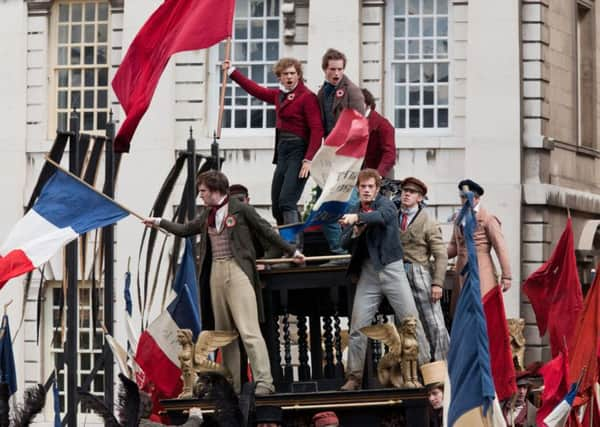Book review: The Novel Of The Century by David Bellos


In recent years, the “biography of a book” has become a rather thriving sub-genre. Of course, we always had works looking at the cultural import of those Desert Island Discs requisites, the Bible and Shakespeare, but works like Declan Kiberd’s Ulysses And Us, Rebecca Mead’s The Road To Middlemarch, Robert Douglas-Fairhurst’s The Story Of Alice and Lila Azam Zanganeh’s The Enchanter: Nabokov And Happiness have carved out a delightful new niche.
David Bellos – who has written three excellent biographies of Romain Gary, Jacques Tati and especially Georges Perec – now enters the field with a book which does justify the hyperbole of its title, though it omits that the century in question is the 19th. Its subtitle is “The Extraordinary Adventure of Les Misérables”. Victor Hugo’s novel is part of that pantheon of books that you don’t need to have read to know about (though you really ought to read it). Thanks to the hit film, which pitted Russell Crowe against Rex Harrison as “Actor Most Reliant On Talking Rhythmically Over Music Rather Than Singing In A Musical”, millions now know the story of Fantine and Cosette, Marius and Gavroche, Jean Valjean and Javert. Although Bellos can be slightly arch about it, it’s a technically decent piece of catchy sentimentality. But he is right that it is a pale imitation of the rewards reading the book offers.
Advertisement
Hide AdReaders who want to know the backstory to the backstory of Les Miz might be swayed by a few of the astonishing facts that Bellos marshals with customary elegance. In terms of the bibliographical clout, he has those toothsome little details that I know I will remember. The novelist Anthony Trollope, whose day job was with the Post Office, organised for a letterbox to be placed on Guernsey where the exiled Hugo was living to accommodate the volume of his correspondence as the proofs for Les Misérables were being corrected. Hugo held out for the highest amount ever paid for a novel from his publishers. Paris was festooned with images of the characters prior to publication, just like a Game Of Thrones teaser advert, but the text was embargoed. All of this is fascinating, but the book would not be the success it is if its only concern was the development of the modern publishing industry – other works, from the high literature of Scott’s anonymous Waverley to the serially published Mysteries Of Paris by Eugene Sue had similar levels of impact; and determining exact figures for readership, re-inflating costs and prices with any degree of exactitude, or even assessing sales in an era prone to piracy and unauthorised editions (an age we see returning with a vengeance in the digital age) is immensely difficult.
Bellos is not saying Les Misérables is important because of how it was written, sold and read, but because of how complex, subtle, clever and moving it is as a novel. These are the parts of the book that truly sparkle. Given his background in translation theory, and as a miraculous translator of Perec among others, he is especially qualified to be precise about this; yet he is also welcoming to the lay-reader. The names, for example, such as Fantine, did not exist in French beforehand, and Bellos parses the neologism beautifully: the -ine is a diminutive, the Fant- is perhaps a contraction of enfant; so her name is reminiscent of “little child”. He is equally good on the argot of the thieves, the secret language of the underclass, and how much of it Hugo just made up. He observes, slyly, that there are a few examples of hapax legomena, words that do not exist anywhere else in French, in Les Misérables. Even French readers might not have “read” the novel.
Anglophone readers suffered a greater disservice: early translators changed things shamelessly and politically, or relegated chapters deemed dull to appendices. Astonishingly, the first full translation of Les Misérables as it first appeared was published for English speakers in 2008; 23 years after the musical version opened.
Throughout, Bellos is a great noticer. Why does Jean Valjean say so little, either aloud or internally? Why is there so little of that staple of 19th century fiction, adultery? Why are significant moments, from Fantine’s resigned acceptance of prostitution to Cosette and Marius’s wedding, passed over almost in silence? This swirls into the relationship between the book and Hugo’s own beliefs: is there really a supernatural presence at the end? Most people who hadn’t read the book, Bellos wryly notes, would be surprised that the author was the one training his guns on the barricades rather than from them in 1848 – and the abortive revolution in the book is in 1832 anyway. It makes a bold and, I think, true claim that Les Misérables was a book trying to hold together centrifugal ideas about poverty, redemption, resistance, degradation and not come down on each or any side. To that end, it would have been enlightening to have the company of Bellos for longer, as other works by Hugo – Notre-Dame de Paris, The Toilers Of The Sea, most of the poetry – get short shrift.
The best aspect of all, and why you should read the book even in translation, is that there is no translation of “Les Misérables”. The poor, the wretched, the wicked, the abandoned, the left-behind, the over-looked: Bellos shows how it means it all, and why the title is always in French.
*The Novel Of The Century by David Bellos, Particular Books, £20